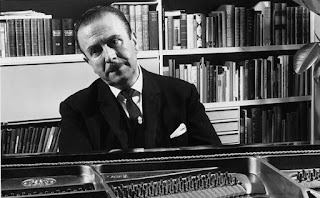Information
Composer: Ludwig van Beethoven
- (01-33) 33 Piano Variations on a waltz by Anton Diabelli, in C major, Op. 120
Claudio Arrau, piano
Date: 1985
Label: Philips
----------------------------------------------------------------------------
Arrau's view of the Variations has not radically changed since 1952. Timings for individual variations are much the same, with Arrau eschewing the very slow speeds in meditative variations favoured by Schnabel in his famous 1937 recording (EMI mono HQM1197, 7/70—nla). Arrau's discreet onward motioning of Var. 14, Grave e maestoso, and his subtle, sensuous way with the beautiful Fughetta (Var. 24), prepare the ground for a reading of the melimsatically lovely Var. 31 that is thoughtful, eloquent, properly lofty.
There is, on the other hand, plenty of wit in Arrau's reading. The Waltz itself is exceptionally spirited and he keeps the energy coursing through the early variations. Sometimes containment makes for added grace and wit as in the scherzando Var. 15. I thought the jokey Mozart variation on the slow side, and some will look for pauses less subject to invasion by the sustaining pedal in Var. 13; but these are minor points. Technically, Arrau is in tremendous form. The recording was made in Switzerland in April 1985 and reveals Arrau massively in control of such things as the trilled serioso Var. 6, the powerful staccato writing of the pesante Var. 9 and the torrential trilled launch of Var. 21. Bishop-Kovacevich plays Var. 17 with more clarity and command and it is possible to think that this and Var. 16 were better projected by Arrau in his 1952 recording. But listening to Arrau's Beethoven it is important not to mistake for a lack of control his concern not to minimize evident difficulty. To play Var. 2 with this kind of knotty mix of accent and phrasing takes enormous insight and control; any technically competent pianist can play the piece smoothly.
Once or twice I thought the sound bottom-heavy (in the late Fuga, for example). The real lambency and reach of Arrau's tone is always best heard in the concert hall, not cabined, cribbed, and confined in a recording studio. I relish the fullness of the Philips sound but if the old Brunswick was too distant, the new one is perhaps too immediate. We catch some of Arrau's agonized breathing in the slow meditations (much soul-wrestling is audible in Var. 20) as well as the quick tap of the fingers in many passages. That said, the recording has been carefully prepared. The CD is fully indexed, from 1 (Tema and Var. 1) to 33, with—a nice touch—just the briefest of pauses after Var. 20.
Whatever view you take of this work, Arrau's is a version to place in your library. It is typical of the differences of view the work engenders that where Brendel, like Schnabel, ends comparatively jauntily (and with intrusive applause) and where Bishop-Kovacevich is serene, logical, lucid right through to the final imaginatively timed and perfectly struck C major chord, Arrau treats the final Minuet as an abiding enigma, a troubled peroration betokening exhaustion—spiritual rather than physical, I should add—at journey's end. Listening to the 82-year-old Arrau's playing of this final variation I was reminded of Edgar's words at the end of King Lear: ''The oldest have borne most; we that are young/Shall never see so much nor live so long''.
-- Richard Osborne, Gramophone
----------------------------------------------------------------------------
Ludwig van Beethoven (baptized 17 December 1770 – 26 March 1827) was a German composer and pianist. A crucial figure in the transition between the Classical and Romantic eras in Western art music, he remains one of the most famous and influential of all composers. Beethoven is acknowledged as a giant of classical music, and his influence on subsequent generations was profound. His best-known compositions include 9 symphonies, 5 piano concertos, 1 violin concerto, 32 piano sonatas and 16 string quartets. Many of his most admired works come from the last decade of his life, when he was almost completely deaf.
https://en.wikipedia.org/wiki/Ludwig_van_Beethoven
https://en.wikipedia.org/wiki/Ludwig_van_Beethoven
***
Claudio Arrau (February 6, 1903 – June 9, 1991) was a Chilean pianist known for his interpretations of a vast repertoire spanning from the baroque to 20th-century composers, especially Beethoven, Schubert, Chopin, Schumann, Liszt and Brahms. He is widely considered one of the greatest pianists of the twentieth century. Although having a big technique and a rich, weighted sonority, Arrau mostly avoided virtuosic displays. He was an intellectual interpreter and his attitude toward music was very serious. He was also a man of remarkable fortitude, even towards the end of his life he still programmed very large, demanding concerts.
https://en.wikipedia.org/wiki/Claudio_Arrau
https://en.wikipedia.org/wiki/Claudio_Arrau
----------------------------------------------------------------------------
FLAC, tracks
Links in comment
Enjoy!




This comment has been removed by the author.
ReplyDeleteCopy Adfly (adf.ly/XXXXXX) or LinkShrink (linkshrink.net/XXXXXX) to your browser's address bar, wait 5 seconds, then click on 'Skip [This] Ad' (or 'Continue') (yellow button, top right).
ReplyDeleteIf Adfly or LinkShrink ask you to download anything, IGNORE them, only download from file hosting site (mega.nz).
If you encounter 'Bandwidth Limit Exceeded' problem, try to create a free account on MEGA.
MEGA
http://adf.ly/1OsJmJ